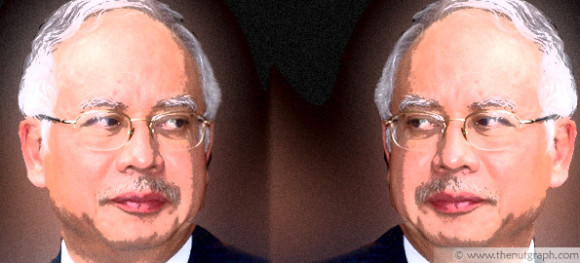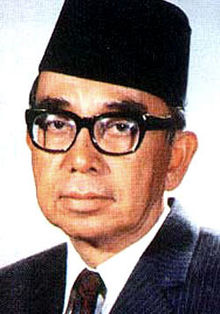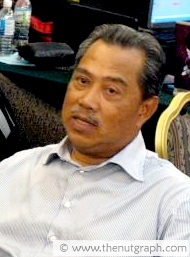PRIME Minister Datuk Seri Najib Razak and his government seem to have had a personality change. Before the 13th general election since independence (GE13), Najib talked about human rights, 1Malaysia and rendering support to the Chinese Malaysian community. Najib after GE13 has re-introduced indefinite detention without trial, focuses on bumiputera empowerment and blamed Chinese Malaysians for his coalition’s worst ever electoral performance. The Nut Graph asks political scientist Wong Chin Huat for his views.

TNG: What’s going on? Why the about-face so suddenly and drastically? What are Najib and Umno trying to prove and to whom?
Najib and Umno are merely adjusting their usual modus operandi. Umno has always had two faces – one of ethno-nationalism and fear-mongering to hold the Malay heartland, and another of moderation to attract the middle ground and ethnic minorities. It’s a tough balancing act, but one that Umno has been doing with some success for a long time. Strong leaders like Tun Abdul Razak and Tun Dr Mahathir Mohamad played these two roles so well that they could switch conveniently and even emerge simultaneously as ethnic champions and national leaders. And by playing both roles, the party’s interests coincided with the leader’s interests.
This changed slightly after the 1999 general election. Desperate to win back Malay Malaysian votes, Mahathir turned against Chinese Malaysian voters who had largely supported him, accusing them of exploiting the Malays’ political division. By doing so, he focused only on his role as the Malay champion, abandoning the other role as a national statesperson.
After Mahathir, a division of labour appeared where these two roles go to different players, giving rise to the perception that there are moderates and hardliners in the party. This has continued under Najib. The story being told by some that Najib is at heart a moderate being cornered by extremists is, therefore, just a fairy tale. There are certainly factions in Umno but, in my view, Najib is fundamentally no more liberal than his deputy Tan Sri Muhyiddin Yassin or even Mahathir.
The two-faced strategy, if it works, benefits everyone in the party. Muhyiddin and Mahathir benefit from Najib’s “moderate” positioning if that wins back Chinese Malaysian votes. Similarly, Najib benefits from Perkasa and Utusan’s antics. They are all pragmatic men to the core.
So what’s different now? Why is Najib’s moderate face now overshadowed by the ethno-nationalist one?

Najib is not strong enough to convincingly speak both the languages of communalism and national interests, as the super-powerful Mahathir or his father Razak did. He, therefore, had to continue with the division of labour after the 2008 general election. This resulted in a schizophrenic, twin strategy. On one hand, under the 1Malaysia banner, there was the inclusive “2R” packaging of “reconciliation” and “reform”; on the other hand, the exclusive “3R” conventional positioning of race (ethnicity), religion and royalty.
Najib, as prime minister, emerged as the “presidential-style” mover of the 2R strategy, with public relations firm Apco and lobbyists in Washington, DC. Being branded an inclusive reformist and the spokesperson of moderates in the Islamic world would give him legitimacy at home and abroad. The 3R strategy was outsourced to the likes of Perkasa’s Datuk Ibrahim Ali and Datuk Zulkifli Nordin, Datuk Dr Hasan Ali, Utusan Malaysia and the Malaysian Islamic Development Department (Jakim), with the support of Mahathir and Muhyiddin.

The division of labour means the players of the two strategies would be rewarded or penalised by their success or failure in executing them. The undisputed fact here is Najib did not deliver and has been significantly weaker. Umno’s increase of nine parliamentary seats and the Barisan Nasional (BN)’s overall decline of seven seats in the last general election have the 3R warlords claiming victory. And the winners want Najib to disown his 2R campaign and lean towards the 3R positioning.
Even if the 2R strategy had attracted back the middle ground, based on Umno’s track record, the position shift from 2R to 3R would still happen – but at a slower pace – under Najib’s control. Any insecurity about its Malay base, as after the 1999 general election, would lead Umno to emphasise the 3R positioning. Feeling too secure, such as after the BN’s strong 2004 performance, would lead Umno politicians to turn their energies to out-Malaying one another. It is only when Umno feels fairly secure of Malay Malaysian support but uncertain of non-Malay Malaysian support, as after the 1990 elections, that we see a strong 2R strategy, such as Mahathir’s Vision 2020.
But will the return to a strong 3R positioning win back Malay Malaysians who have drifted away from Umno? Will this strengthen the BN as a whole in readiness for the next general election?
I doubt that Umno cares much about the BN’s survival as long as it can hold on to East Malaysia through its Sabah chapter and vassal parties like PBB, PBS, PRS, SPDP, UPKP and PBRS.
The future of Umno’s survival depends on two games it plays: Strengthening its electoral position through malapportionment and gerrymandering, and maintaining a captive market within an expanding and tightly policed Malay-Muslim political community.

With just 29.45% and 2.10% vote share, Umno and its sole Muslim-dominated partner, Sarawak’s PBB, hold 39.64% and 6.31% of parliamentary seats, only 4% short of a simple majority. If Umno/BN gets to redraw the constituencies the way it likes, it’s not difficult for them to win 5% to 7% more seats and achieve a simple majority. And if the Umno-PBB axis holds a simple majority, they will be able to command support from some vassal parties.
Umno’s minimal target is, therefore, to hold on to its existing vote-bank, rather than attract a massive return of ex-supporters. While Umno certainly wants to dominate the Malay-Muslim vote, the key of its survival really lies in the Umno-PBB core having about one-third of national votes. This is done by increasing the number of Malay-Muslim voters and then maintaining, and if possible, growing Umno support among Malay-Muslims. Other than Project IC in Sabah, this basically involves converting non-Muslims, especially bumiputera ones, to Islam and also assimilating non-Malay Muslims as Malays.
Assimilating the indigenous peoples of Sabah and Sarawak as Malays has been Umno’s unspoken goal from Day One of Project Malaysia. This ethnic expansion is made possible with selective incentives in the form of “bumiputera privileges” for only Malay-Muslims, denying even non-Muslim bumiputeras.
However, an externally expanding ethnic group is futile if it becomes internally pluralised and adopts different political allegiances. To ensure that Malay-Muslims stay interested in Umno’s Malay-Muslim ethno-nationalist discourse, the “deviants” must be policed and, if possible, silenced or banished. This encompasses religious and non-religious groups such as the Shiites, socialists, liberals, women, homosexuals, and subculture groups like heavy metal. This explains why the intra-Muslim policing has become more widespread after the last general election.
What does this mean for Malaysia? Attempting to polarise the communities is not a new strategy, but the effects are felt more and more today. Are we becoming more united or more fragmented?
Real reform is not possible within a well-protected Umno that sits on the apex of the electoral one-party state. Umno’s regime maintenance requires three things: Electoral manipulation, ethnic expansion of the majority group through economically enticed conversion and assimilation, and policing of the ethnic majority.
Of these three mechanisms, the most difficult to break is the economically powered ethnic expansion. “Bumiputera privileges” serve as a selective incentive to hold a captive market for Umno. And this is the heart of the problem: Should Malaysia be a plural democracy or an ethnocracy? We cannot move on as a nation until “bumiputeraism” is dealt with, but raising this has become so politically incorrect and sensitive that any open discussion on it is immediately shut down.

Bumiputera privileges have become like the lottery. Perhaps 99% of lottery ticket buyers lose money and only 1% gain. Most of the money goes to the operator. It’s a scam, but why do people still buy lottery tickets? It gives them hope and a chance of good luck.
Most bumiputeras are like the 99% lottery ticket buyers who pay the price in the forms of economic lethargy and cronyism alongside the non-bumiputeras. But they won’t give up the lottery because most of them are poor despite 44 years of bumiputeraism. Now Najib is giving them more lottery tickets.
Is there a way out? Yes, a tough one. Like it or not, non-bumiputeras have to take on the bumiputera problem as their own so that all Malaysians can put their heads together to work out a less costly solution than Najib’s Bumiputera Economic Empowerment Programme (BEEP). Until we Malaysians come together to lift the poor bumiputeras out of their poverty, most will still turn to Umno and we will have to pay the price of Umno’s parasitic rule for much longer.
What about the poor non-bumiputera? Of course, every poor Malaysian deserves help. And we should work to dismantle communal prejudice so that Malaysian citizenship is an equal blessing to all. But until then, helping the poor bumiputera would be the utmost political priority. In other words, we need to find a better alternative to BEEP. Unfair? Yes, but the consequence of not doing this would be living longer under Umno’s corrupt rule. ![]()
Wong Chin Huat is a political scientist by training and was a journalism lecturer prior to joining the Penang Institute, a Penang government think tank. If readers have questions and issues they would like Wong to respond to, they are welcome to e-mail editor@thenutgraph.com for our consideration.


Lynn Cheang says
If Wong Chin Huat’s observation and analysis are correct and I have no doubt that he is, then it is scary for ordinary Malaysians especially the 52% who did not vote BN.
And I feel even more dreadful that within the online community, many Sarawakians, even amongst opposition supporters and frontliners, think that preventing UMNO from coming into Sarawak is the bigger issue than the current self-styled rajah.
Flag of Truth says
UMNO and the ruling government are now focusing their attention on Muslims and Malays especially after an all-out strategy to win the heart and mind of Chinese voters in GE13. Now it is proven that without the Chinese votes, UMNO can still form a government even though half of the Malay votes were divided.
If certain groups feel left out especially post GE13, then they shouldn’t blame others. It’s their decision and they have already calculated the risks, hence the willingness to accept the consequences of their action.
It is immature to assume that the ruling government will ignore its own people, but to be in power one should choose to take sides.
neptunian says
It is immature indeed. When you say they “assume the ruling govt will ignore its own people” you mean to say, its supporters. The rest be damned. Don’t forget that more than 40% of Malays also did not vote for the BN govt, meaning those who did not vote for BN, regardless of race are not “own” people.
Of course, with a mindset like Flag of Truth’s running the govt, we have seen this “damnation” already, in the case of Kelantan.
Flag of Truth says
@ Kong Kek Kuat?
So what do you want government to do? Give support to those who don’t support them? And believe me, when giving this ‘support’, the govt [would] have turned its back on its true voters. Now it is time to set the path straight. The Muslims will always rally behind whoever can protect their interest. And besides, sometimes there are ‘collateral damages’.
C’est la vie.
An Unimportant Person says
Flag of Truth,
An all-out strategy to win the hearts and minds of Chinese Malaysians?
You are kidding, aren’t you?
The UMNO/BN strategy in GE13 boiled down to no more than outright monetary bribery at the bottom-end with a few piddling concessions thrown in at the top end.
So, after GE13, it appears that UMNO/BN is being encouraged to only help those who have voted for them!! Is this an example of what a modern and progressive government is?
Can you imagine Barack Obama saying that he will only give aid to black Americans because they voted him in?
Or David Cameron alienating whole sections of British citizens because they didn’t vote for him?
Or Tony Abbott refusing to fund further Aboriginal programs because they voted against him?
You should really think about your beliefs if you feel that the above examples are perfectly OK.
Flag of Truth says
Why must all of you [be] afraid? This is classical conditioning…you have to support the government (even a little bit) in order to have your voice heard. Some groups choose to vote against the govt (nearly 100% of the votes – for certain groups obviously) and it is clear what they want. My advice is try again in the next GE, but I bet that things will change when that time comes.. because people like all of you will finally come to their senses 🙂
An Unimportant Person says
FOT,
//you have to support the government (even a little bit) in order to have your voice heard//
Really??
So, you feel “ObamaCare” should be given only to black Americans because white Americans did not vote for Obama?
As far as you are concerned, the aboriginals in Australia can rot because they did not vote for Tony Abbott.
You see, that is the difference between you and me.
I would help you even if you did not vote for me but you will not help me because I did not vote for you.
I believe in treating all Malaysians equally while you believe in treating Malaysians unequally.
And sadly, you don’t seem to see a problem with that – not ethically, not morally.
Never mind, I guess it is for me as a Malaysian to find new ways to change Malaysia so that all Malaysians can benefit, not just the ones who will vote for me.
Flag of Truth says
@ An unimportant person
Yea. I wish you good luck in changing that :). However please do it through democracy 🙂
An Unimportant Person says
FOT,
Sorry, but I don’t have enough money to do it through the system which UMNO, laughingly, calls “democracy”.
Kong Kek Kuat says
@ Flag of Truth
O gosh… I am so doomed as a Malaysian. I never thought that all this while, it was UMNO that was the reason I am still alive.
Kong Kek Kuat says
@Lynn Cheang
The UMNO-come-into-Sarawak thing is a red herring (but what an interesting coincidence that UMNO = red and herring, and there is in fact a sea separating Malaya and Sarawak, don´t you think?).
UMNO will not be able to appeal to the masses of Sarawak natives. The Chinese-Sarawakians are already on the opposite side of the Sarawak Assembly, generally. So, without the majority of the natives and the Chinese-Sarawakians, UMNO will be more like one of those minor parties in the Sarawak chapter of BN. Mind you, the Malays in Sarawak are a mere fraction of Sarawakians, the majority for whom their Sultan is the Sultan of Brunei.
Of course, UMNO will be UMNO. They will try to use their federal influence to convert the minds of the natives, and do what they did to Sabah, or do both. Expect lots of “I help you, you help me,” and Islamisation. But, UMNO is not guaranteed to succeed. UMNO (unlike PBB) as a concept itself repels the natives or anyone not Malay.
There will remain many who are still chained to a feudal mentality (unable to comprehend the simple fact that WE, not those we elected, are the bosses), with all their ampun-ampun, bersyukurlah, etc. which makes them even more vulnerable when a monotheistic religion is brought into the debate to confuse and conflate the issues, problems, and solutions. Also, there are Chinese-Sarawakians who would rather vote PBB if they can to keep the status quo than to vote for any of the Opposition. But that is because these Chinese-Sarawakians have not tasted the racism and bigotry that their fellow Malayans have tasted in the hands of UMNO. I am not defending Taib, but nobody can accuse Taib Mahmud of racism and bigotry.
Therein lies the basic answer to the UMNO-come-into-Sarawak fallacy. I am not saying that UMNO is to be underestimated, because they do have federal power, unfortunately. But it is a fallacy to think that UMNO can just waltz into Sarawak and take over in the next 20 years.
Flag of Truth says
@ Kong Kek Kuat,
It is the reality of life…every action has consequences. We must know how to play our cards right. 🙂
Kong Kek Kuat says
@ Flag of Truth
Ya kah? I didn´t know that the govt was playing cards when it comes to taking care of Malay interests.
Flag of Truth says
@ Kong Kek Kuat
This is quite normal. You don’t expect a ruling government [to] turn its back on its core voters, [do you]? 🙂 Malays and Muslims form 70% of the population :).
And judging from certain groups’ action, even after an all-out attempt to win their support, they should be responsible if they feel left behind. It is their choice.
[…]
Gopal Raj Kumar says
Helping the Chinese? I thought you were all ‘Anak Bangsa Malaysia’? Detention without trial? Well show me one country in the world where the practice of detention without trial does not exist? One may not refer to it as the ISA but detention either as an administrative or executive action exists universally.
Now that you have as a part of the Chinese polity in Malaysia lost the elections and had your representation demolished by an act of chauvinism and disloyalty, why should the rest of the nation be sympathetic to your self-inflicted lost selfish causes?
But of course in your quest for ‘democratic’ change you will as always, in accordance with the policy of your publication, seek to exercise censorship by refusing publication of my response or in the alternative seek to edit my response as if you are possessed of a superior grammar.
Kong Kek Kuat says
@ Gopal Raj Kumar
Mappillai, I believe the Comments Editor was doing all the readers here on The Nut Graph a favour by making your grammar more comprehensible. No hard feelings macha, but like some commentators here on The Nut Graph, you are hard to understand most of the time.
Flag of Truth says
@ An Unimportant Person
“Sorry, but I don’t have enough money to do it through the system which UMNO, laughingly, calls ‘democracy’.”
There are lots of people who are corrupted by money :). It takes two to tango. We know that certain groups use this tactic in business and their formed triad organisations. So I am not surprised :).
Good luck on changing the system. Maybe you can go to these organisations to ask for some money so that you can change the system 🙂